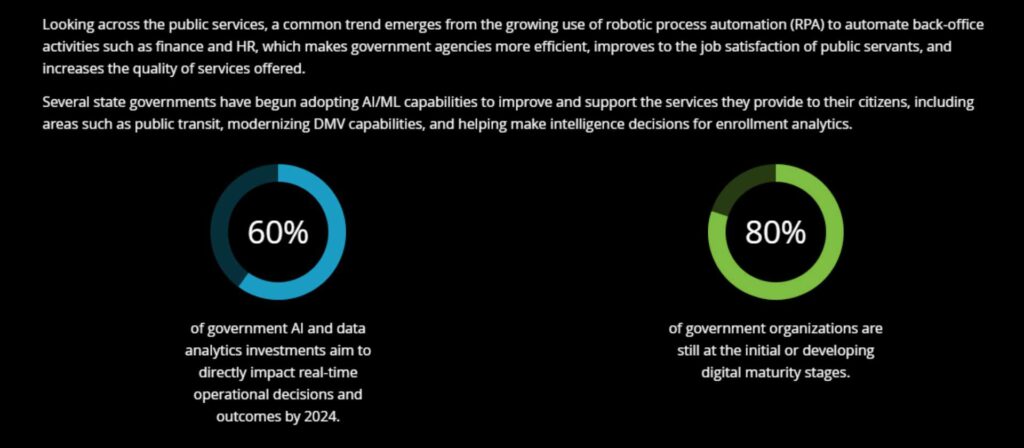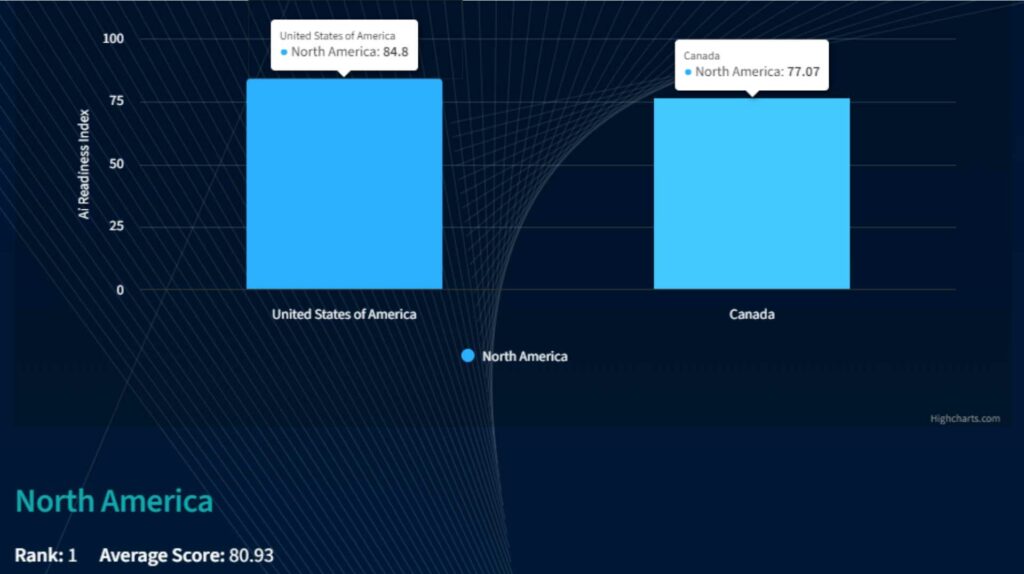As people experience increasing convenience brought about by advances in digital technologies, they expect the same level of efficiency from government services. However, while advanced economies, such as Singapore, rapidly adopt new technologies to realise their vision of a Smart Nation, many places around the world continue to be hesitant to let go of their well-established bureaucratic procedures.
According to Deloitte’s Report, The Government and Public Services AI Dossier, the levels of AI adoption and maturity tend to vary among different government agencies. Most of the time, it’s the military and law enforcement who take advantage of these new technologies the most. Overall, while 60 per cent of AI and data science investments are intended to impact some aspects of government services by 2024, in actuality, 80 per cent of government agencies are still in the initial phase or development stage of their digital maturity.

Some of the barriers mentioned in the report are the lack of AI and data management talents, lack of confidence in the AI’s reliability, and dependence on legacy digital infrastructure. Fortunately, every year, countries continue to invest in data science and AI technologies to develop better policies and optimise their government services. In Oxford Insights’ Government AI Readiness Index 2023, the United States topped the list as the country that’s most prepared to adopt AI in the delivery of government services. The US outperformed other countries in all 3 pillars where the index was based—government, technology sector, and data & infrastructure.

So, what are the vital roles that data science and AI play in revolutionising government services? This article delves into the essential roles that data science and AI play in revolutionising the public sector.
1. Create Smarter Policies
While governments have always relied on statistical analysis in crafting new policies, modern data science can uncover hidden insights that may be overlooked using traditional analytical methods. Governments can use these insights to inform policy decisions, predict the potential impact of proposed policies, and evaluate the effectiveness of existing policies.
In Belgium, an AI crowdsourcing tool by CitizenLab was able to collect 1,700 ideas and 32,000 votes from citizens protesting against inaction toward climate change in 2019. The data was then analysed and interpreted using the platform’s data analysis programme. This resulted in 15 climate change policies which the Belgians voted on.
2. Enhance Planning Through Predictive Analytics
Predictive analytics equips governments with the foresight to anticipate future trends and needs. This enables proactive planning and resource allocation.
Using predictive modelling, economists can reliably foresee economic downturns, which can help countries prepare and implement resiliency measures. Moreover, governments can forecast demand for public services, infrastructure requirements, and demographic shifts by leveraging historical data and advanced algorithms.
3. Streamline Service Delivery
AI-powered solutions such as chatbots, virtual assistants, and automated systems streamline citizen interactions with government agencies. Thanks to these technologies, government offices and their online platforms can provide a quicker response and more satisfying user experience.
Tools like optical character recognition (OCR), cognitive automation, speech recognition, and machine translation can also make short work of the bureaucratic red tape that is often due to the large amount of paperwork that government workers are forced to process manually. With automated tools, workers can focus on more important tasks such as providing personalised services to citizens.

4. Manage Transportation Networks
Through tech advancements like object detection, computer vision, and camera-based traffic systems, traffic authorities can identify locations where accidents are highly likely to occur and deploy measures to prevent these from happening.
Additionally, AI-powered systems can facilitate the development of intelligent transportation systems, such as autonomous trains and smart traffic lights, which have the potential to further enhance traffic and public transportation efficiency and safety.
5. Implement Targeted Crime Prevention Strategies
Data science and AI play a crucial role in law enforcement by enabling the implementation of targeted crime prevention strategies. Predictive policing techniques analyse historical crime data to identify high-risk areas and predict potential security threats. This allows law enforcement agencies to deploy resources effectively and prevent crime before it occurs.
When it comes to cybercrime prevention, on the other hand, AI can help government agencies monitor unusual online activities, identify data vulnerabilities, simulate a cyber attack in controlled environments, and deliver patches automatically to keep networks and systems secure at all times.
6. Facilitate Better Health Care and Social Services
In terms of healthcare and social services, data science revolutionises service delivery by improving patient care, disease management, and social welfare programmes.
During the COVID-19 pandemic, the UK’s National Health Service (NHS) used data science in their Test and Trace service. Using a topic modelling approach, an unsupervised machine learning technique, the service was able to come up with quick actionable insights, which were critical for the country’s recovery. Additionally, data-driven approaches enable governments to tailor social services to the specific needs of individuals and communities. This ensures more equitable and effective support systems.
Data science and artificial intelligence offer unprecedented opportunities for governments to improve their leadership potential and provide innovative public service that their citizens deserve. As people continue to navigate the complexities of the modern world, harnessing the power of data science and AI will be instrumental in building more efficient, responsive, and inclusive governments for all.

💼 Elevate Your Data Intelligence with Tesseract Academy!
🔥 Tesseract Academy specializes in empowering government agencies with top-tier education, consulting, and implementation services in data science and AI. Whether you’re in law enforcement, transportation, healthcare, or policy-making, our programs are tailored to enhance your understanding and utilization of these transformative technologies.
Enhance your skills with our comprehensive data science courses, meticulously designed for non-technical professionals like you. Start your journey towards mastering data science and AI for impactful governance today at Tesseract Academy!

